Airbnb's Strategic Responses to the Global COVID-19 Pandemic
VerifiedAdded on 2023/01/07
|7
|1286
|97
Report
AI Summary
This report examines the significant impact of the COVID-19 pandemic on Airbnb, a leading multinational online rental company. It delves into the challenges faced, including a drastic decline in revenue and market value due to travel cancellations and reduced demand. The report analyzes Airbnb's responses, such as employee layoffs and the implementation of refund policies, and offers a suggestion for alternative strategies from a CEO's perspective. A PESTLE analysis is conducted to assess the political, economic, social, technological, legal, and environmental factors affecting the company. The report highlights both positive aspects, like the creation of online activities for employee engagement, and negative aspects, such as the impact of free cancellations on the company's customer base. The conclusion summarizes the key findings, providing an overview of Airbnb's adaptation and the implications of the pandemic on its operations and future strategies.
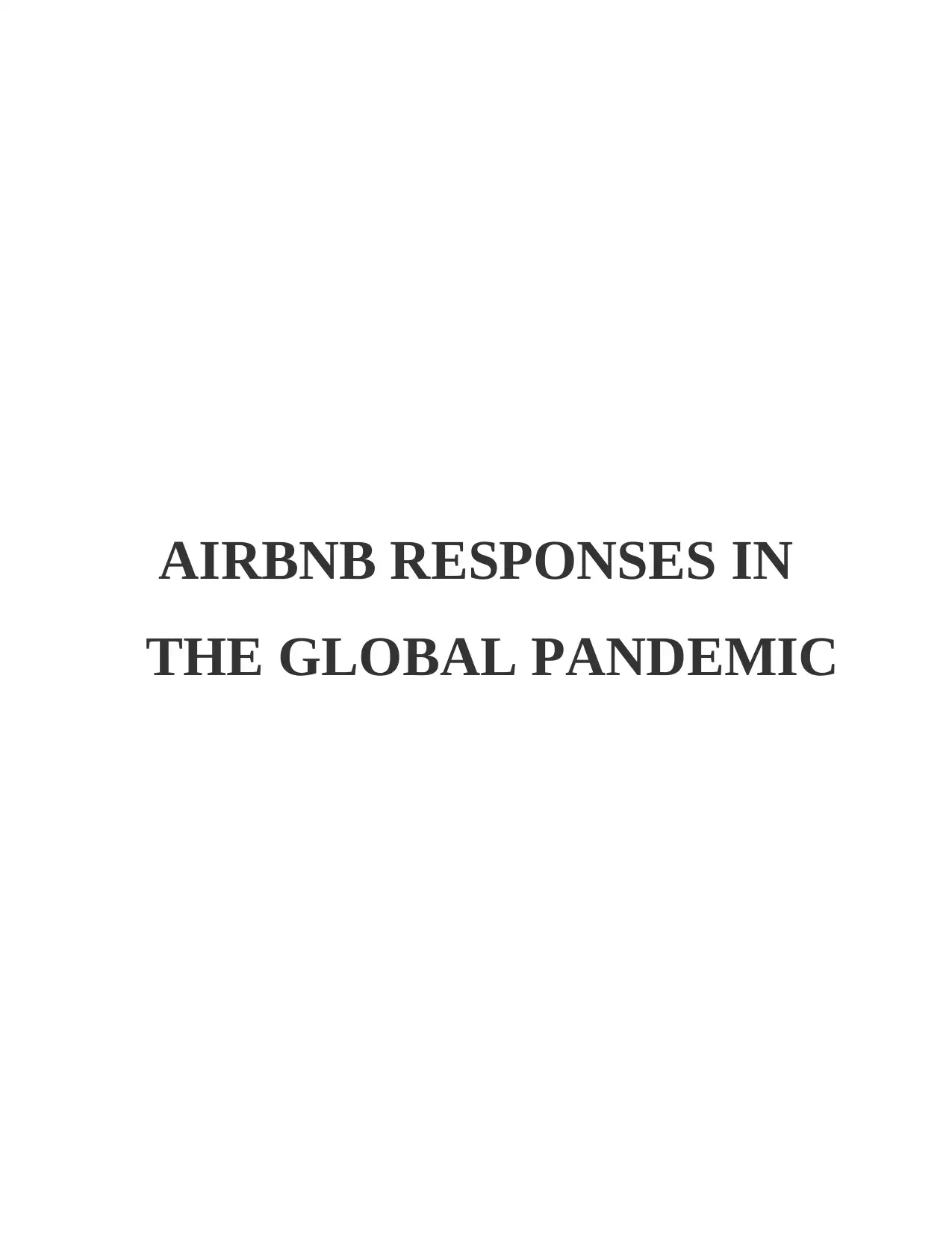
AIRBNB RESPONSES IN
THE GLOBAL PANDEMIC
THE GLOBAL PANDEMIC
Paraphrase This Document
Need a fresh take? Get an instant paraphrase of this document with our AI Paraphraser
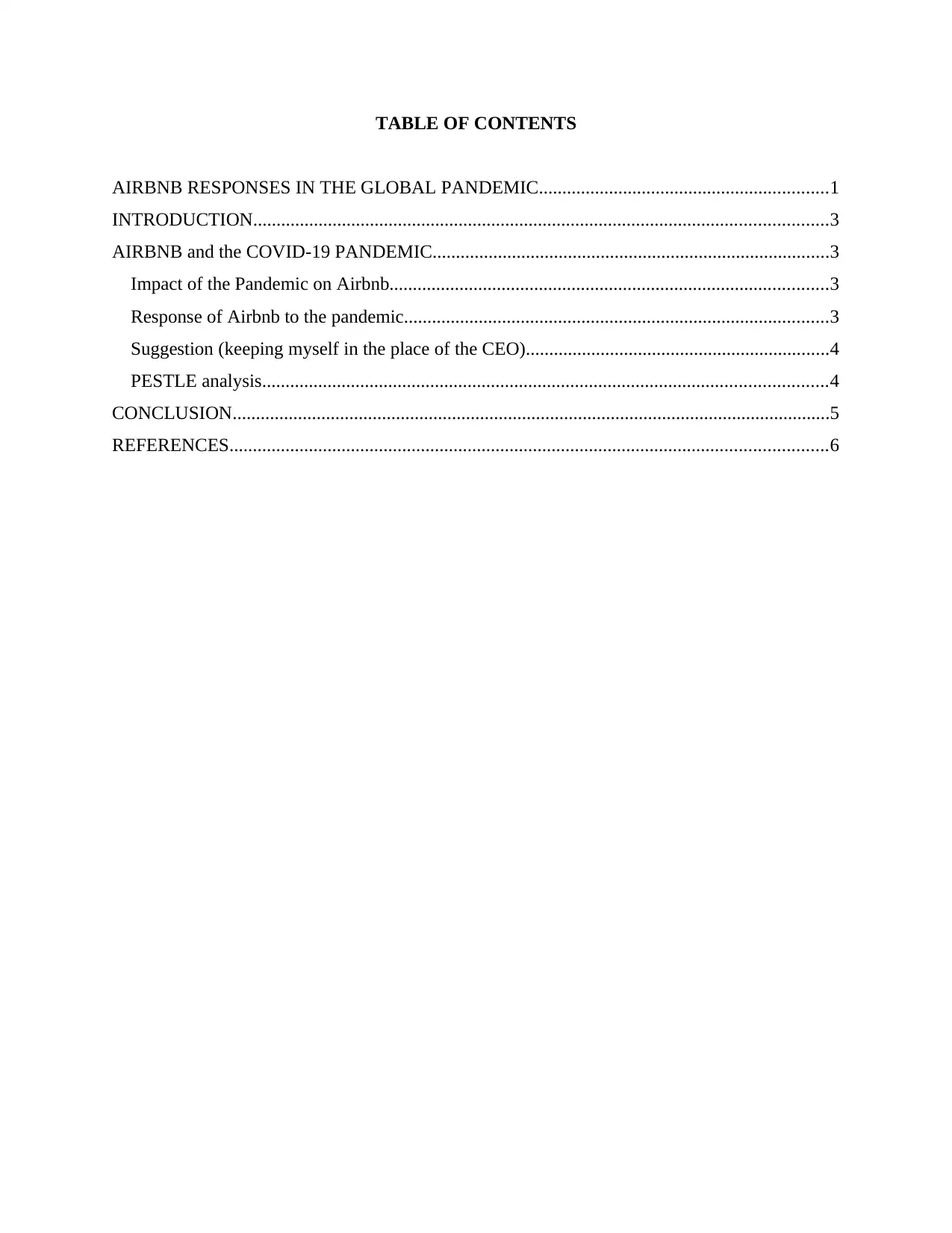
TABLE OF CONTENTS
AIRBNB RESPONSES IN THE GLOBAL PANDEMIC..............................................................1
INTRODUCTION...........................................................................................................................3
AIRBNB and the COVID-19 PANDEMIC.....................................................................................3
Impact of the Pandemic on Airbnb..............................................................................................3
Response of Airbnb to the pandemic...........................................................................................3
Suggestion (keeping myself in the place of the CEO).................................................................4
PESTLE analysis.........................................................................................................................4
CONCLUSION................................................................................................................................5
REFERENCES................................................................................................................................6
AIRBNB RESPONSES IN THE GLOBAL PANDEMIC..............................................................1
INTRODUCTION...........................................................................................................................3
AIRBNB and the COVID-19 PANDEMIC.....................................................................................3
Impact of the Pandemic on Airbnb..............................................................................................3
Response of Airbnb to the pandemic...........................................................................................3
Suggestion (keeping myself in the place of the CEO).................................................................4
PESTLE analysis.........................................................................................................................4
CONCLUSION................................................................................................................................5
REFERENCES................................................................................................................................6
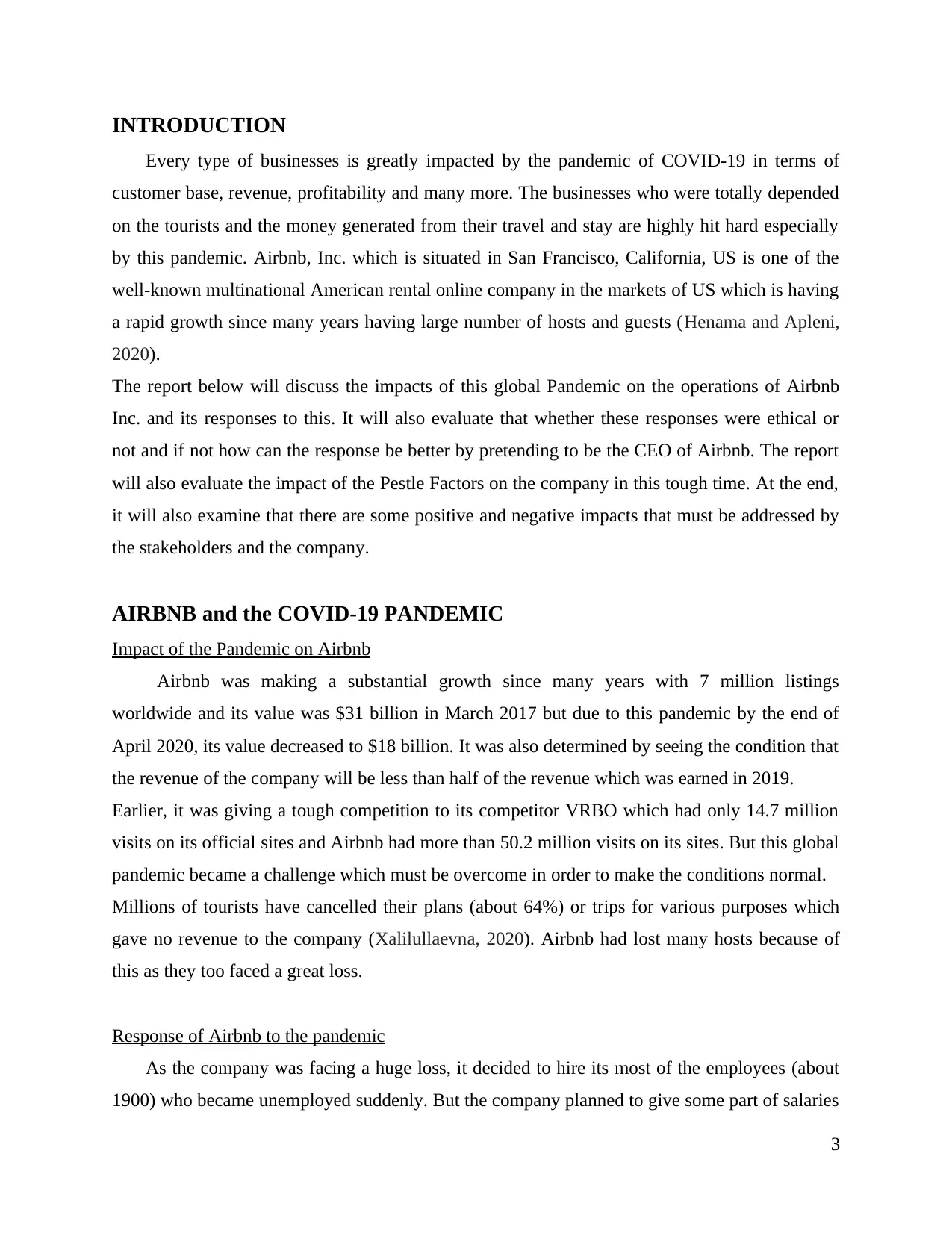
INTRODUCTION
Every type of businesses is greatly impacted by the pandemic of COVID-19 in terms of
customer base, revenue, profitability and many more. The businesses who were totally depended
on the tourists and the money generated from their travel and stay are highly hit hard especially
by this pandemic. Airbnb, Inc. which is situated in San Francisco, California, US is one of the
well-known multinational American rental online company in the markets of US which is having
a rapid growth since many years having large number of hosts and guests (Henama and Apleni,
2020).
The report below will discuss the impacts of this global Pandemic on the operations of Airbnb
Inc. and its responses to this. It will also evaluate that whether these responses were ethical or
not and if not how can the response be better by pretending to be the CEO of Airbnb. The report
will also evaluate the impact of the Pestle Factors on the company in this tough time. At the end,
it will also examine that there are some positive and negative impacts that must be addressed by
the stakeholders and the company.
AIRBNB and the COVID-19 PANDEMIC
Impact of the Pandemic on Airbnb
Airbnb was making a substantial growth since many years with 7 million listings
worldwide and its value was $31 billion in March 2017 but due to this pandemic by the end of
April 2020, its value decreased to $18 billion. It was also determined by seeing the condition that
the revenue of the company will be less than half of the revenue which was earned in 2019.
Earlier, it was giving a tough competition to its competitor VRBO which had only 14.7 million
visits on its official sites and Airbnb had more than 50.2 million visits on its sites. But this global
pandemic became a challenge which must be overcome in order to make the conditions normal.
Millions of tourists have cancelled their plans (about 64%) or trips for various purposes which
gave no revenue to the company (Xalilullaevna, 2020). Airbnb had lost many hosts because of
this as they too faced a great loss.
Response of Airbnb to the pandemic
As the company was facing a huge loss, it decided to hire its most of the employees (about
1900) who became unemployed suddenly. But the company planned to give some part of salaries
3
Every type of businesses is greatly impacted by the pandemic of COVID-19 in terms of
customer base, revenue, profitability and many more. The businesses who were totally depended
on the tourists and the money generated from their travel and stay are highly hit hard especially
by this pandemic. Airbnb, Inc. which is situated in San Francisco, California, US is one of the
well-known multinational American rental online company in the markets of US which is having
a rapid growth since many years having large number of hosts and guests (Henama and Apleni,
2020).
The report below will discuss the impacts of this global Pandemic on the operations of Airbnb
Inc. and its responses to this. It will also evaluate that whether these responses were ethical or
not and if not how can the response be better by pretending to be the CEO of Airbnb. The report
will also evaluate the impact of the Pestle Factors on the company in this tough time. At the end,
it will also examine that there are some positive and negative impacts that must be addressed by
the stakeholders and the company.
AIRBNB and the COVID-19 PANDEMIC
Impact of the Pandemic on Airbnb
Airbnb was making a substantial growth since many years with 7 million listings
worldwide and its value was $31 billion in March 2017 but due to this pandemic by the end of
April 2020, its value decreased to $18 billion. It was also determined by seeing the condition that
the revenue of the company will be less than half of the revenue which was earned in 2019.
Earlier, it was giving a tough competition to its competitor VRBO which had only 14.7 million
visits on its official sites and Airbnb had more than 50.2 million visits on its sites. But this global
pandemic became a challenge which must be overcome in order to make the conditions normal.
Millions of tourists have cancelled their plans (about 64%) or trips for various purposes which
gave no revenue to the company (Xalilullaevna, 2020). Airbnb had lost many hosts because of
this as they too faced a great loss.
Response of Airbnb to the pandemic
As the company was facing a huge loss, it decided to hire its most of the employees (about
1900) who became unemployed suddenly. But the company planned to give some part of salaries
3
⊘ This is a preview!⊘
Do you want full access?
Subscribe today to unlock all pages.

Trusted by 1+ million students worldwide
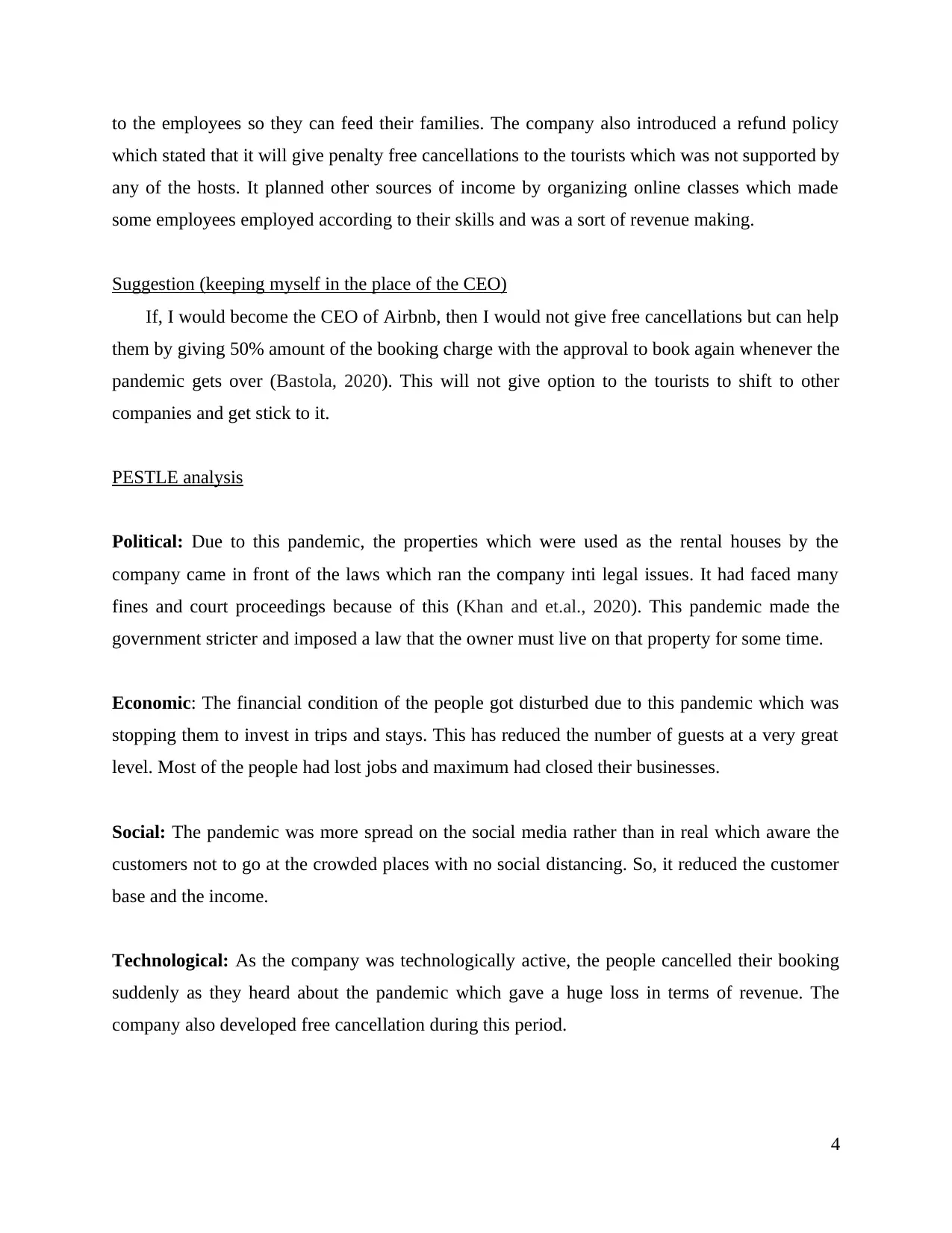
to the employees so they can feed their families. The company also introduced a refund policy
which stated that it will give penalty free cancellations to the tourists which was not supported by
any of the hosts. It planned other sources of income by organizing online classes which made
some employees employed according to their skills and was a sort of revenue making.
Suggestion (keeping myself in the place of the CEO)
If, I would become the CEO of Airbnb, then I would not give free cancellations but can help
them by giving 50% amount of the booking charge with the approval to book again whenever the
pandemic gets over (Bastola, 2020). This will not give option to the tourists to shift to other
companies and get stick to it.
PESTLE analysis
Political: Due to this pandemic, the properties which were used as the rental houses by the
company came in front of the laws which ran the company inti legal issues. It had faced many
fines and court proceedings because of this (Khan and et.al., 2020). This pandemic made the
government stricter and imposed a law that the owner must live on that property for some time.
Economic: The financial condition of the people got disturbed due to this pandemic which was
stopping them to invest in trips and stays. This has reduced the number of guests at a very great
level. Most of the people had lost jobs and maximum had closed their businesses.
Social: The pandemic was more spread on the social media rather than in real which aware the
customers not to go at the crowded places with no social distancing. So, it reduced the customer
base and the income.
Technological: As the company was technologically active, the people cancelled their booking
suddenly as they heard about the pandemic which gave a huge loss in terms of revenue. The
company also developed free cancellation during this period.
4
which stated that it will give penalty free cancellations to the tourists which was not supported by
any of the hosts. It planned other sources of income by organizing online classes which made
some employees employed according to their skills and was a sort of revenue making.
Suggestion (keeping myself in the place of the CEO)
If, I would become the CEO of Airbnb, then I would not give free cancellations but can help
them by giving 50% amount of the booking charge with the approval to book again whenever the
pandemic gets over (Bastola, 2020). This will not give option to the tourists to shift to other
companies and get stick to it.
PESTLE analysis
Political: Due to this pandemic, the properties which were used as the rental houses by the
company came in front of the laws which ran the company inti legal issues. It had faced many
fines and court proceedings because of this (Khan and et.al., 2020). This pandemic made the
government stricter and imposed a law that the owner must live on that property for some time.
Economic: The financial condition of the people got disturbed due to this pandemic which was
stopping them to invest in trips and stays. This has reduced the number of guests at a very great
level. Most of the people had lost jobs and maximum had closed their businesses.
Social: The pandemic was more spread on the social media rather than in real which aware the
customers not to go at the crowded places with no social distancing. So, it reduced the customer
base and the income.
Technological: As the company was technologically active, the people cancelled their booking
suddenly as they heard about the pandemic which gave a huge loss in terms of revenue. The
company also developed free cancellation during this period.
4
Paraphrase This Document
Need a fresh take? Get an instant paraphrase of this document with our AI Paraphraser
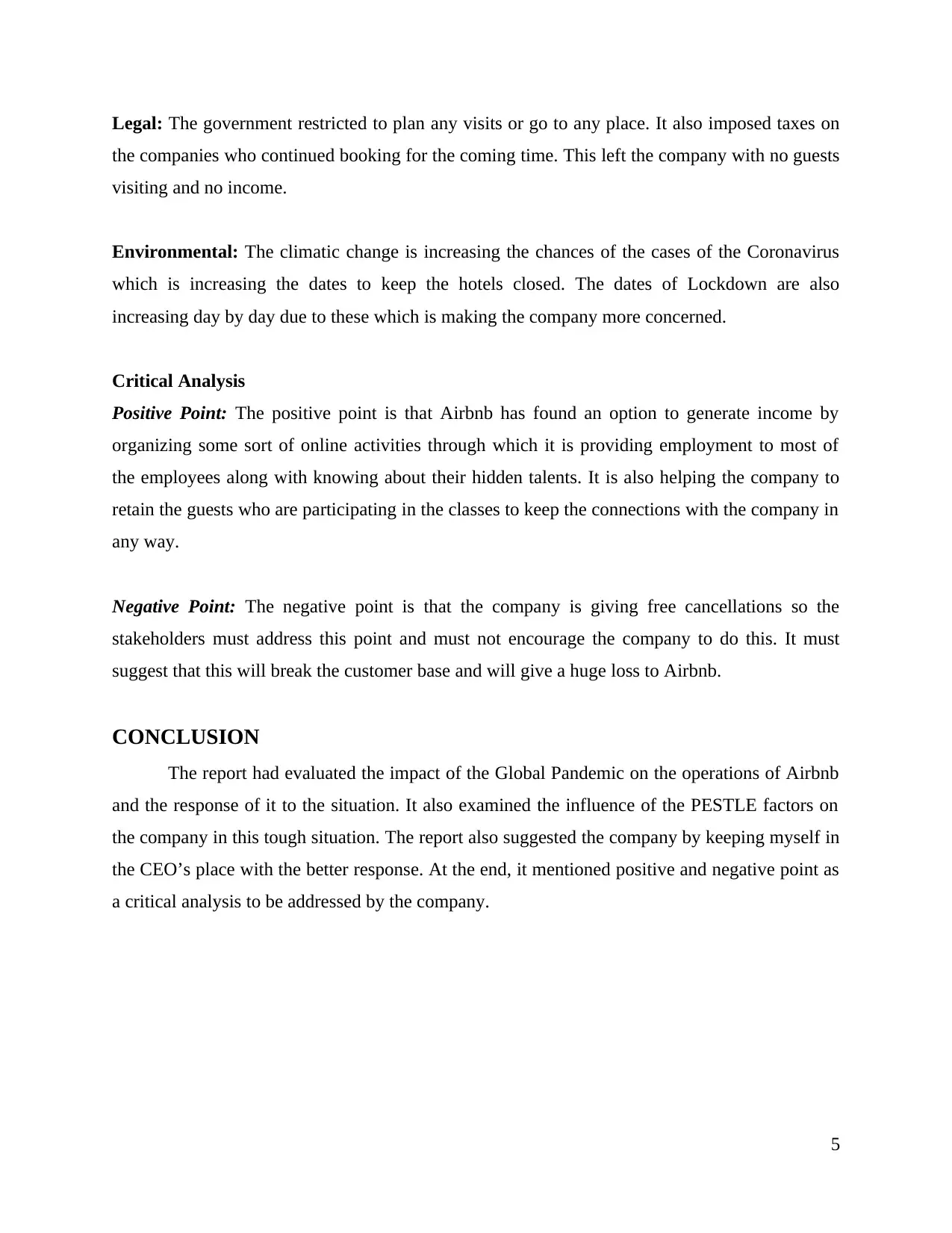
Legal: The government restricted to plan any visits or go to any place. It also imposed taxes on
the companies who continued booking for the coming time. This left the company with no guests
visiting and no income.
Environmental: The climatic change is increasing the chances of the cases of the Coronavirus
which is increasing the dates to keep the hotels closed. The dates of Lockdown are also
increasing day by day due to these which is making the company more concerned.
Critical Analysis
Positive Point: The positive point is that Airbnb has found an option to generate income by
organizing some sort of online activities through which it is providing employment to most of
the employees along with knowing about their hidden talents. It is also helping the company to
retain the guests who are participating in the classes to keep the connections with the company in
any way.
Negative Point: The negative point is that the company is giving free cancellations so the
stakeholders must address this point and must not encourage the company to do this. It must
suggest that this will break the customer base and will give a huge loss to Airbnb.
CONCLUSION
The report had evaluated the impact of the Global Pandemic on the operations of Airbnb
and the response of it to the situation. It also examined the influence of the PESTLE factors on
the company in this tough situation. The report also suggested the company by keeping myself in
the CEO’s place with the better response. At the end, it mentioned positive and negative point as
a critical analysis to be addressed by the company.
5
the companies who continued booking for the coming time. This left the company with no guests
visiting and no income.
Environmental: The climatic change is increasing the chances of the cases of the Coronavirus
which is increasing the dates to keep the hotels closed. The dates of Lockdown are also
increasing day by day due to these which is making the company more concerned.
Critical Analysis
Positive Point: The positive point is that Airbnb has found an option to generate income by
organizing some sort of online activities through which it is providing employment to most of
the employees along with knowing about their hidden talents. It is also helping the company to
retain the guests who are participating in the classes to keep the connections with the company in
any way.
Negative Point: The negative point is that the company is giving free cancellations so the
stakeholders must address this point and must not encourage the company to do this. It must
suggest that this will break the customer base and will give a huge loss to Airbnb.
CONCLUSION
The report had evaluated the impact of the Global Pandemic on the operations of Airbnb
and the response of it to the situation. It also examined the influence of the PESTLE factors on
the company in this tough situation. The report also suggested the company by keeping myself in
the CEO’s place with the better response. At the end, it mentioned positive and negative point as
a critical analysis to be addressed by the company.
5
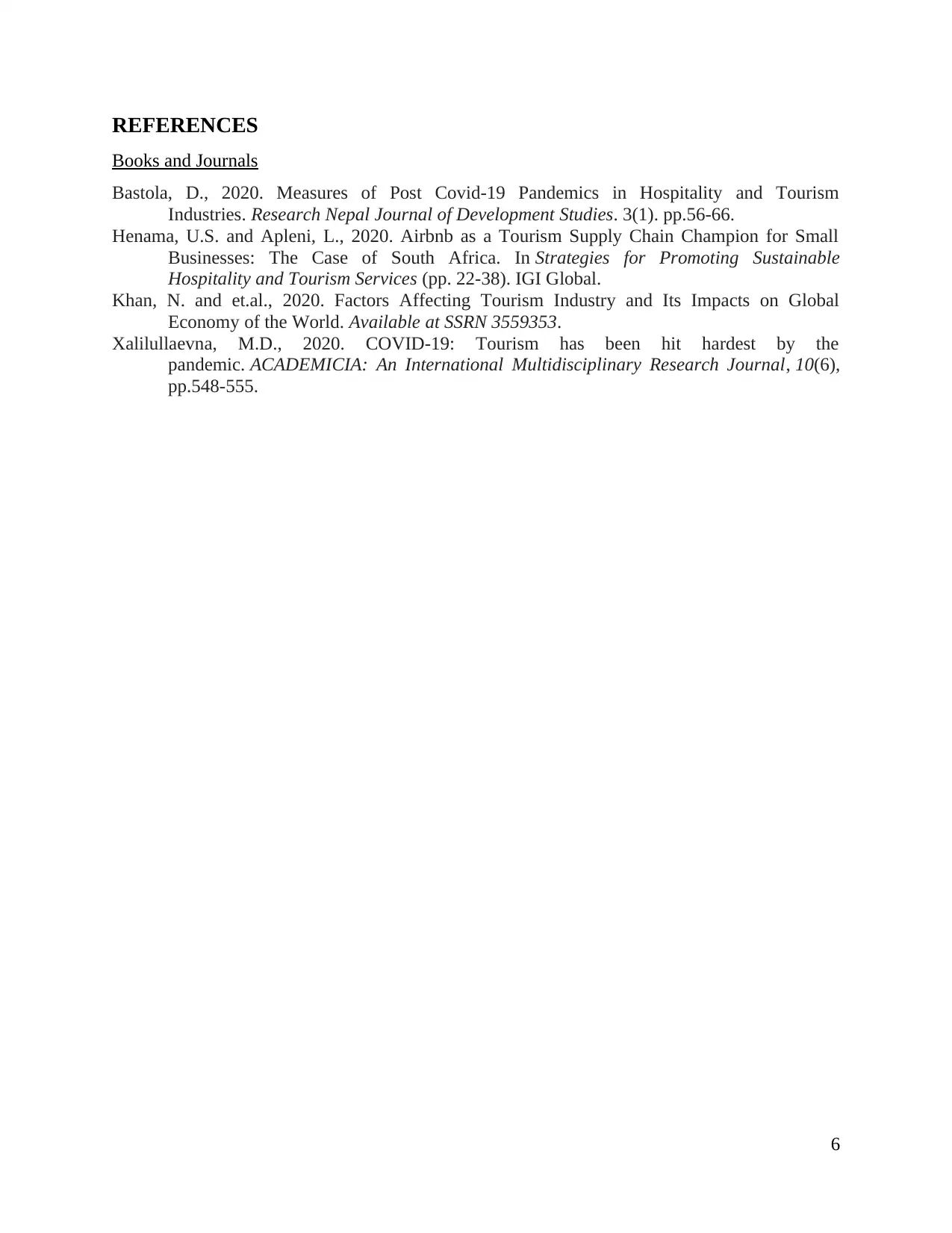
REFERENCES
Books and Journals
Bastola, D., 2020. Measures of Post Covid-19 Pandemics in Hospitality and Tourism
Industries. Research Nepal Journal of Development Studies. 3(1). pp.56-66.
Henama, U.S. and Apleni, L., 2020. Airbnb as a Tourism Supply Chain Champion for Small
Businesses: The Case of South Africa. In Strategies for Promoting Sustainable
Hospitality and Tourism Services (pp. 22-38). IGI Global.
Khan, N. and et.al., 2020. Factors Affecting Tourism Industry and Its Impacts on Global
Economy of the World. Available at SSRN 3559353.
Xalilullaevna, M.D., 2020. COVID-19: Tourism has been hit hardest by the
pandemic. ACADEMICIA: An International Multidisciplinary Research Journal, 10(6),
pp.548-555.
6
Books and Journals
Bastola, D., 2020. Measures of Post Covid-19 Pandemics in Hospitality and Tourism
Industries. Research Nepal Journal of Development Studies. 3(1). pp.56-66.
Henama, U.S. and Apleni, L., 2020. Airbnb as a Tourism Supply Chain Champion for Small
Businesses: The Case of South Africa. In Strategies for Promoting Sustainable
Hospitality and Tourism Services (pp. 22-38). IGI Global.
Khan, N. and et.al., 2020. Factors Affecting Tourism Industry and Its Impacts on Global
Economy of the World. Available at SSRN 3559353.
Xalilullaevna, M.D., 2020. COVID-19: Tourism has been hit hardest by the
pandemic. ACADEMICIA: An International Multidisciplinary Research Journal, 10(6),
pp.548-555.
6
⊘ This is a preview!⊘
Do you want full access?
Subscribe today to unlock all pages.

Trusted by 1+ million students worldwide

7
1 out of 7
Related Documents
Your All-in-One AI-Powered Toolkit for Academic Success.
+13062052269
info@desklib.com
Available 24*7 on WhatsApp / Email
![[object Object]](/_next/static/media/star-bottom.7253800d.svg)
Unlock your academic potential
Copyright © 2020–2026 A2Z Services. All Rights Reserved. Developed and managed by ZUCOL.





